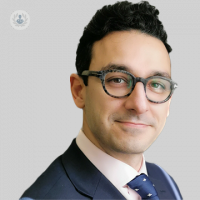When is knee osteotomy considered for a patient?
Written in association with:Top Doctors recently caught up with esteemed consultant knee surgeon, Mr Arman Memarzadeh, who, in this article below, is on hand to tell about knee osteotomy, including when it’s considered, the risks, and the success rate of the procedure.

What is knee osteotomy?
In a knee osteotomy, either the tibia (shinbone) or femur (thighbone) is cut and then reshaped to relieve pressure on one compartment of the knee joint.
When is knee osteotomy considered for a patient?
Knee osteotomy is used when a patient has early-stage osteoarthritis that has damaged just one side of the knee joint.
What are the associated risks?
Knee osteotomy is extremely safe, but complications can nonetheless occur in a minority of cases. These can include:
- blood clots
- infection
- injury to surrounding nerves and blood vessels
- failure for the osteotomy to heal, or delay in the healing
- ongoing symptoms
- numbness around scars
- fracture
- non-union, i.e. osteotomy site doesn’t heal
Who is an ideal candidate for knee osteotomy?
Knee osteotomy is most effective for thin, active patients who are under the age of 60. Good candidates have pain on only one side of the knee and no pain under the kneecap. Patients who notice that their knee pain is brought on mostly by activity or by standing for a long period of time are ideal candidates for knee osteotomy.
What is the success rate of knee osteotomy?
A knee osteotomy is usually very effective when it comes to reducing knee pain caused by arthritis. More than 80 per cent of patients can return to their normal daily routines within a year after surgery.
What is recovery time like?
Recovery from a knee osteotomy can be difficult. A bone is cut during the procedure, and it needs time to heal. You may be able to resume normal activities between three to six months after your surgery. However, complete recovery can range from six months to an entire year.
To schedule in an appointment with Mr Arman Memarzadeh, you can head on over to his Top Doctors profile to do just that today.


